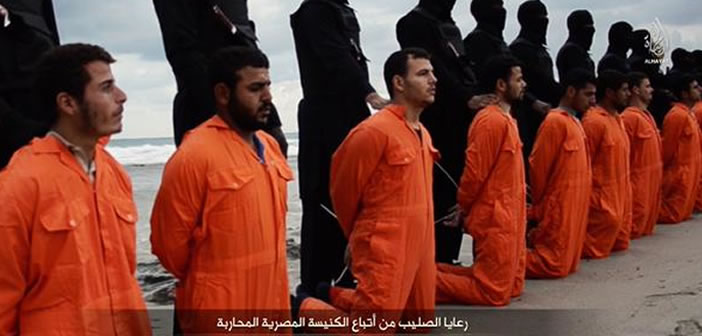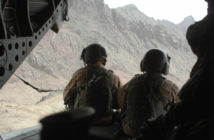The Islamic State (IS) has released a video showing the beheading of 21 Egyptian Coptic Christians in Libya.
The video begins with IS militants marching the 21 civilians along the cost of the Mediterranean Sea, near the Libyan capital of Tripoli.
The Christians are then forced onto their knees, where they are allowed to say their final prayers before being being beheaded en masse.
In contrast to most previous beheading videos aimed at a Western audience, the act of beheading in this video is captured in a brutal sweeping cinematic shot, which appears to have been filmed from a drone.
The group, variously known as ISIS, ISIL, or Daesh, claims that the video was in response to Egyptian schoolteacher Kamilia Shehata, who they claim was kidnapped and forcibly converted to Christianity by Coptic Christians in Egypt in 2010. There is no evidence to support this theory, Shehata appeared on television in 2011 stating that the rumours of her forced conversion were false.
In what appears to be a Dutch accent, the executioner asserts that the location of the executions shows that the “fighters of Islam are ever nearer to the beaches of Rome and the Crusaders”. He goes on to claims the IS will “conquer Rome” and colour the Mediterranean Sea red with the blood of their captives.
Italy, the former colonial power in Libya, lies less than 500 miles (750km) from the Libyan coast.
In a televised address to the country after the release of the video, Egyptian President Abdel Fattah al-Sisi declared seven days of national mourning. He went on to describe the IS militants as “inhuman criminal killers” and said that “Egypt and the whole world are in a fierce battle with extremist groups carrying extremist ideology and sharing the same goals”.
The 21 victims had been kidnapped in December and January from the coastal town of Sirte in eastern Libya, which is under the control of Islamist groups.
Thousands of Egyptian men are forced to work in Libya, mostly in the construction sector, despite the instability due to the struggling economy in Egypt.
Libya descended into chaos following the overthrow of dictator Muammar Gaddafi in 2011, with various warring militias in control of cities and towns in the country.
After elections in 2014, the democratically elected government was forced out of Tripoli and is currently based in Tobruk in the north-east of Libya, while Benghazi, the capital of the 2011 revolution, is controlled by Islamists. The militia on control of the eastern city of Derna pledged allegiance to the Islamic State and self-proclaimed caliph, Abu Bakr al-Baghdadi, in October 2014.




